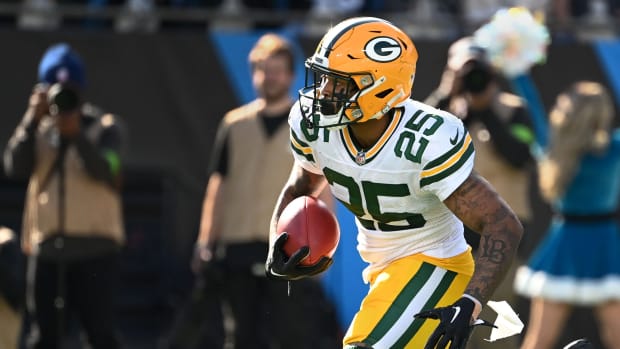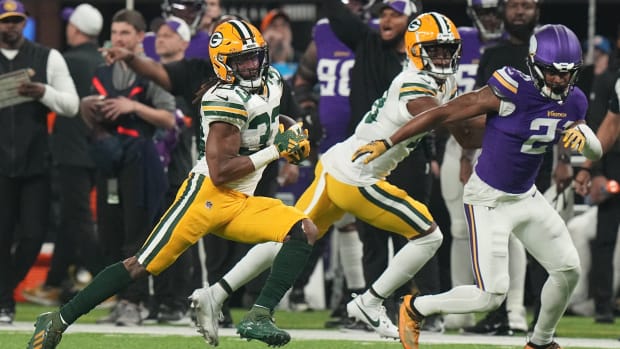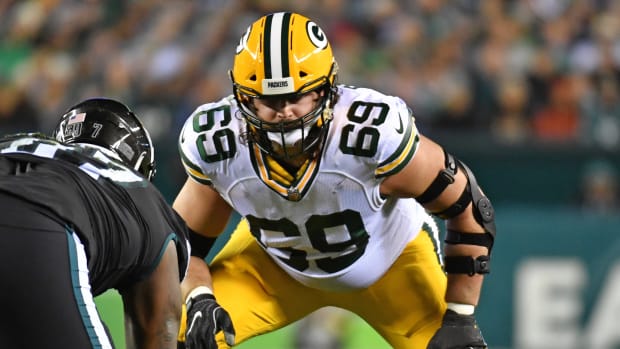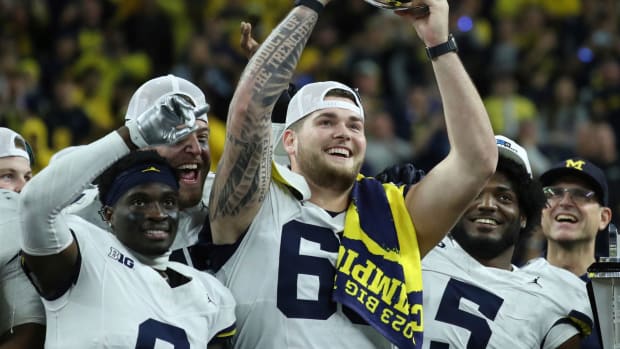Packers Legend Willie Davis Dies
GREEN BAY, Wis. – Green Bay Packers legend Willie Davis died on Wednesday at age 85.
Davis was a 15th-round pick in 1956 by the Cleveland Browns, though he didn’t enter the league until 1958 following his service in the U.S. Army. A guard and linebacker at Grambling, Davis was tried on both sides of the ball by the Browns until he was acquired in a masterful trade by Vince Lombardi.
Davis wasn’t happy – he had an opportunity to start on the offensive line in Cleveland – and considered quitting. Lombardi, however, saw what the Browns didn’t – his potential on defense.
Video: PFF ranks the Packers' roster by tiers
"I consider speed, agility and size to be the three most important attributes in a successful lineman," Lombardi told Davis. "Give me a man who has any two of those dimensions and he'll do OK. But give him all three and he'll be great. We think you have all three."
Davis was, indeed, great. He was a five-time All-Pro and Pro Bowler and a member of the NFL’s all-1960s team in helping the Packers win five championships and the first two Super Bowls. In 1981, he was inducted into the Pro Football Hall of Fame.
RELATED: WILLIE DAVIS, FROM THE SI.COM VAULT
“It is with great sadness that the entire Pro Football Hall of Fame family mourns the passing of Willie Davis,” Hall of Fame President & CEO David Baker said in a statement. “Willie’s extraordinary athleticism was an undeniable factor in Green Bay’s winning tradition of the 1960s under Coach Lombardi. He helped the Packers through an unprecedented championship run and to two Super Bowl victories. Willie was a man of true character on and off the field. The Hall of Fame will forever keep his legacy alive to serve as inspiration to future generations.”
Davis played in all 162 career games. He played before sacks were an official stat but ranks as perhaps the greatest pass rusher in franchise history. And to think, Lombardi acquired him for end A.D. Williams. In Williams' one season with the Browns, he started one game and caught one pass.
Davis, who was appointed by Lomabardi the first African-American team captain in franchie history and inducted into the Packers Hall of Fame in 1975, was a frequent visitor to Lambeau Field and participant in team functions over the years. He was a member of the team's board of directors from 1994 through 2005.
“The Green Bay Packers Family was saddened today to learn about the passing of Willie Davis,” Packers President/CEO Mark Murphy said in a statement. “One of the great defensive players of his era, Willie was a significant contributor to the Packers’ five NFL championship teams during the 1960s.
“I enjoyed getting to know Willie and his wife, Carol, especially when he served as our honorary captain for the 2010 NFC Championship game and Super Bowl XLV, and again for the 2014 NFC Championship game. He was a great role model for our players. ... We extend our deepest condolences to Carol, as well as their family and friends.”
Off the field, Davis enjoyed tremendous business success. He started Willie Davis Distributing in 1970 and All-Pro Broadcasting in 1976, and he served on the boards of directors of Dow Chemical and American Express, among other companies.
All of that led to Davis being a finalist to become NFL commissioner in 1989, a job that went to Paul Tagliabue.
“The emphasis on good habits is something that I learned from Coach Lombardi and have preached to myself over my years as a business leader,” Davis wrote in “Closing the Gap: Lombardi, The Packers Dynasty And The Pursuit Of Excellence,” the autobiography published in 2012. “We can deceive ourselves by thinking that having a clear goal in mind is enough to keep us on track, but it’s not. … We must develop good habits to keep on the path.”
One of Davis's long-term goals was to reduce the importance of sports in the U.S. "We've narrowed to a point where almost all the glamour in some parts of society is with athletics," he told Sports Illustrated. "We need to know about more examples outside athletics, more businesspeople and technical and professional people, so that we can say, 'Aha, there's an African-American making a difference.' I try to emphasize to people that I am an exception. A lot of folks who are doing what I'm doing didn't play football."
Davis was born on July 24, 1934, in Lisbon, La. His mother didn’t want him to play football.
“My mother was afraid I would get hurt so I played my first two high school games without her knowing I was on the varsity,” he told the Pro Football Researchers Association. “The only reason she found out was that our third game was on the road and there was no way I could stay out that late without her knowing what was going on.”





